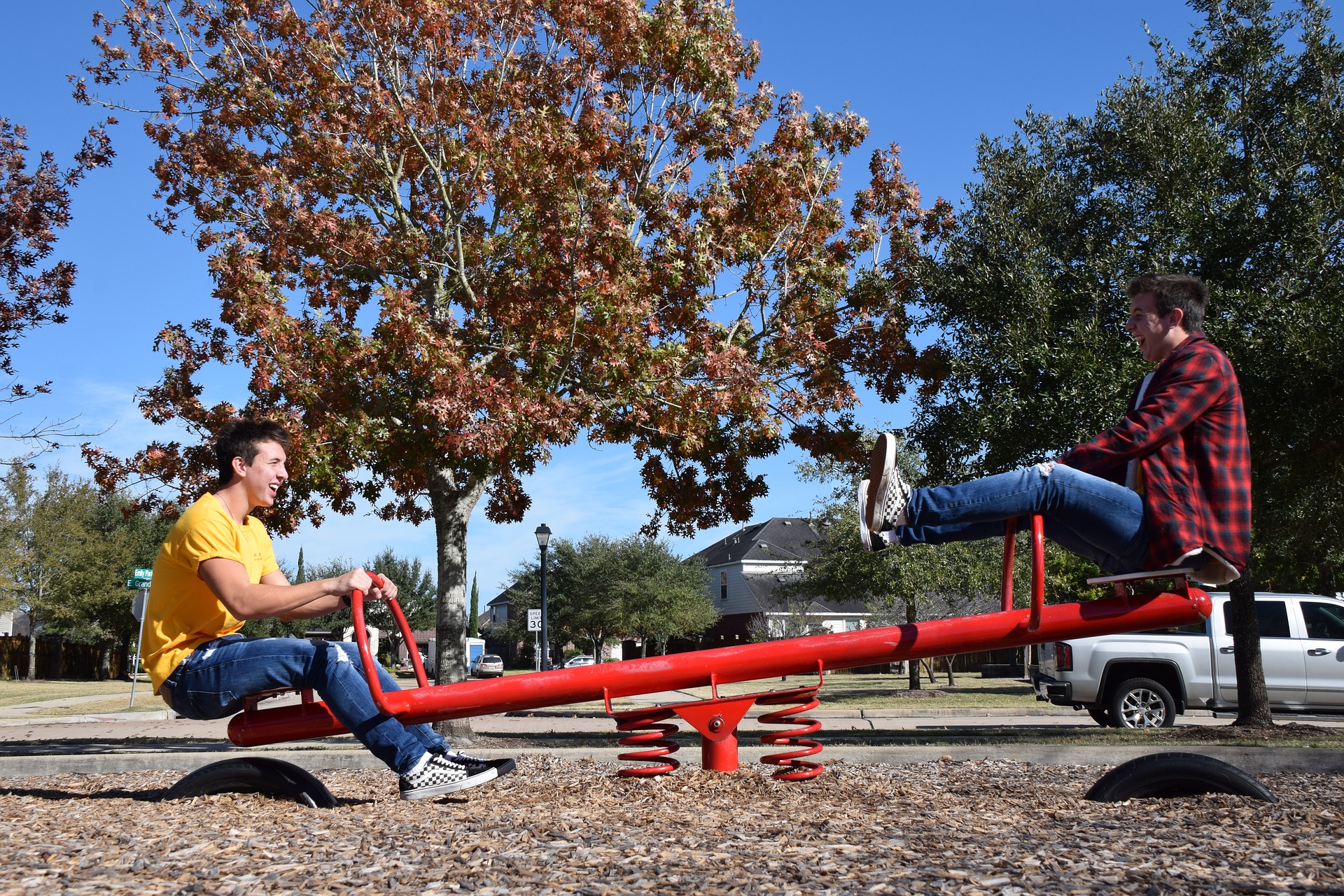Weight?
w= mass x gravity
What is the value of Gravity on earth?
9.8 m/s2
when applying a force, as area increases, what happens to the pressure?
pressure decreases
A car moves from rest to a speed of 20 m/s in 5s , calculate its acceleration.
Acceleration= V2 - V1 / time
Acceleration= 20-0 / 5 = 4m/s²
State one disadvantage of thermal expansion.
Any of these:
• Expansion of solids can damage the railway lines, so gaps are left between sections to avoid this.
• In bridges, gaps are left between its sections which can slide over rollers to avoid its damage.
• Contraction can damage electrical wires in cold weather, so they are hung loose to avoid this.
Density?
D = Mass / Volume
True or False?
Work is not done when you push the an object but it doesn’t move.
True
Up thrust force increases as:
1-
2-
1. Volume of the immersed part increases .
2. Density of the liquid increases.
 What is the moment of the yellow-shirt guy if his weight is 900 N and is sitting at a distance of 2 m from the centre?
What is the moment of the yellow-shirt guy if his weight is 900 N and is sitting at a distance of 2 m from the centre?
Moment = Force x Distance
M = 900 x 2
M = 1800 N.m
What is Brownian motion?
Smoke particles are seen as bright spots and are hit by lighter air molecules making them move randomly in all directions (zigzag path).
Acceleration?
a = Change in speed / time
or
a = (Velocity2- Velocity1) / time
 In a (Speed-Time graph), what does the area under the graph get?
In a (Speed-Time graph), what does the area under the graph get?
Distance
What happens if there is no resultant force on an object?
Either ..................................... or ...........................................
- If it is at rest, it stays at rest .
- If it is moving, it keeps on moving at a constant speed in a straight line.

What is the total distance moved by this car overall?
State the unit
280 m
3 Factors affecting the rate of evaporation
- Temperature
- Surface area
- Wind Speed
- Humidity
Hooke's Law?
Force = constant x extension
or
F = k x
how to increase stability of an object?
Say 2 reasons
1) By having a larger base area.
2) By having a lower centre of mass.
When will the body be in equilibrium?
The body will be in equilibrium:
When the resultant forces are equal to zero AND when the resultant moment is equal to zero.
What is the temperature in Kelvin when it is 37 degrees Celsius?
Temp. in Kelvin = temp in Celsius + 273
Tk = 37 + 273 = 310 K
What happens to the temperature during melting or boiling?
During melting or boiling, heat energy is absorbed to break the bonds and the molecules start to move away from each other, without changing their K.E.
So the temperature remains constant.
Power?
P= Work done / time
or
P= Energy transferred / time
State 4 renewable energy sources.
1- Geothermal
2- Solar
3- Wind
4- Energy generated from Water (Tidal, Wave, Hydroelectric Dam).
State what is the "Nuclear fission reaction" process in generating Electricity.
Nuclear fuels (Uranium) release heat through a nuclear reaction.
This reaction is: Heavy uranium nucleus is divided into lighter nuclei using a neutron and large amount of heat is then released.
Then, this thermal energy resulting from the nuclear fission reaction is then used to vaporize huge amounts of water into steam to rotate turbines that drives a generator and produces electricity.
 This baby is pushing the table with a force of 15 N for a distance 10 m and it took 20 sec.
This baby is pushing the table with a force of 15 N for a distance 10 m and it took 20 sec.
What is his Power?
Power = Work done / time
P = F x d / t
P= 15 x 10 / 20
P= 7.5 Watt
At constant temperature:
State what happens to pressure, when volume is decreased?
When the volume of a vessel containing a certain gas is decreased, the rate of collisions on the walls of the container increases (they hit the wall more frequently but with same speed).
Which leads to the rise in the gas pressure.